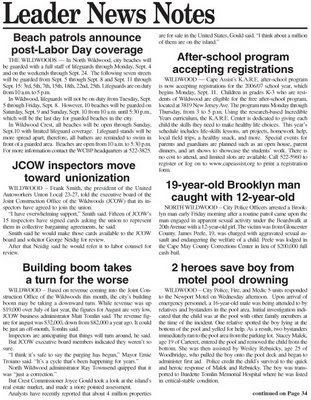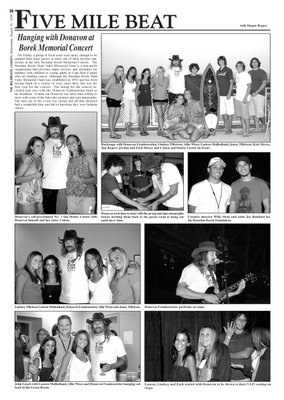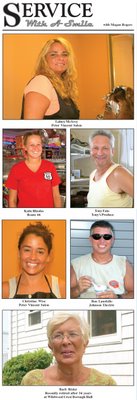







By MAUREEN L. CAWLEY
Correspondent
WILDWOOD – It’s a handyman’s special.
But obtaining the necessary construction permits to repair the crumbling chimney and weather-worn windows of this Pacific Avenue office space is not likely to be a problem. After all, the employees who work at the Joint Construction Office of the Wildwoods (JCOW) are eager to have their building repaired.
“There are several problems with the building,” said Matt Tomlin, who took over as JCOW’s Business Administrator earlier this month.
“The chimney is broke. You can’t fire up the boiler,” he said, so for now, there is no way to heat the building’s second floor.
Window air conditioners provide cool air, but the windows are worn and unstable.
“You can put a finger through (them),” Tomlin said.
And then there’s the carpet.
“The guys upstairs said there are creatures crawling out of it,” he said. He’s hoping that having it professionally cleaned will buy them some time.
And well, it’s not a priority, but the building could use a paint job, as well.
At his first meeting as JCOW’s administrator, Tomlin acknowledged that there are numerous issues that need attention at JCOW, but in his first few weeks in office, building maintenance issues have come to the forefront. Employees in the building have asked him to intervene on their behalf.
“Our work day and our work life is really important to us,” Tomlin said.
“It doesn’t look great that our building inspectors’ office is in a building that is falling apart,” board member Ray Townsend, of North Wildwood, said.
And according to Tomlin, some inspectors have doubts that the building could pass a code inspection.
“People have the right to expect that they’ll work in a safe and secure building,” said board member, Kevin Yecco, of the Crest.
The board agreed that the issues need to addressed, but it won’t be cheap.
Tomlin said that $13,500 was set aside in JCOW’s budget for building maintenance and repairs, and $3,500 has been used already. That leaves only $10,000 to pay for an estimated $2,800 for new windows and a new heating and air conditioning system for the building’s second floor.
With winter approaching, the building needs a reliable heating system, Tomlin said, and replacing the defunct chimney could cost between ten and 15 thousand dollars. It may make more sense to replace the boiler-dependent system with a more efficient HVAC system, he said.
Board member Floyd Speigel, Ed Koehler and Chris Fox were assigned to a building committee to take a closer look at cost-effective solutions to the issues and funding the repairs.
Tomlin said that he’s taken a careful look at the budget to see if money can be taken from another line item. Revenue from interest was not included in the budget this year, he said, and that money may be available to fund the necessary building improvements. The board agreed to give him the authority to allocate up to $5,000 per project without board approval.
In the 2007 budget, Tomlin said, he intends to make sure that a capital fund is set up to pay for issues like this.
As Chief Financial Officer (CFO), Tomlin is paying close attention to how the organization has been spending its money. Board members received copies of JCOW’s 2006 audit report, and for the third year in a row, auditor Ford, Scott, Seidenberg & Kennedy found fault with the way JCOW manages its money.
“It’s very disturbing,” Yecco said.
The auditor found that JCOW had overspent on certain line items, and certain financial reports were not signed by a CFO.
Tomlin was hired as the CFO last month, and he will sign all future reports, he said.
The “overspending on certain line items” was due to an insurance cost that was charged to the wrong place, Tomlin said. In 2004 and 2005, auditors found that JCOW lacked a cash management plan and was not reconciling its books correctly. Those issues have since been addressed.
A computerized accounting program was implemented earlier this year, and Tomlin said he anticipates it will help to avoid future problems.
He said he’s going to work hard to make sure that there are no issues to address in next year’s audit.
Before approving the payment of bills at Friday’s meeting, the board discussed a $17,000 annual bill for auto insurance on seven cars, and Tomlin said he would see if that can be reduced.
And Speigel asked if management could schedule inspectors to work together at some building sites to avoid excess fuel costs.
A $550 dollar cell phone bill for July drew scrutiny from board members. The bills are exceptionally high since each JCOW inspector was authorized to sign up for his own phone and calling plan, Tomlin said. And the organization will need to pay $1200 to buy out of each plan. There are eight phones.
Government entities buy in bulk to save money, Yecco said. “Who gave them the authority? How is that possible? Yecco said.
“We have 53 phones in North Wildwood, and I don’t think it’s much more than that,” Townsend said. He is North Wildwood’s administrator.
Construction official Mario Zaccaria said that he had authorized the plans, following the protocol that was in place when he took over as construction official. Tomlin has since been put in place to manage the office, though Zaccaria is still in charge of inspections and plan review.
Tomlin said he is pleased at the confidence the board has placed in him, and he will work hard to improve the organization.
Some good news did come out of JCOW’s 2006 audit, Tomlin said.
“It indicates that JCOW is now sitting on $1.7 million dollars,” Tomlin said.
But in light of ongoing litigation as it relates to more than 100 properties (see related story), board members did not seem enthusiastic about the proposed windfall. It could quickly be swallowed up in legal fees.
“It’s all going to go to (JCOW attorney) Glenn (Callahan),” Yecco said.
CAPE MAY COURT HOUSE – Property owners from Wildwood and North Wildwood crowded into the courtroom on Thursday to hear how Superior Court Judge Steven Perskie planned to resolve the legal quagmire surrounding fire code violations in some 79 new condominium buildings.
His plan is as simple, as it is painful.
“We’re going to fix the buildings quickly, or we’re going to vacate the buildings,” he said. “The condominium (owner) is ultimately responsible.”
To many of the nearly 500 homeowners who found out in February that their buildings lacked necessary fire safety elements like fire walls, sprinkler systems and adequate means of egress, this was disturbing news.
Since receiving notice of the code violation in their buildings, condo owners have been in negotiations with builders, architects and the Joint Construction of the Wildwoods (JCOW), as they’ve attempted to figure out how to remedy various code compliance issues. They’ve tried to determine exactly what is wrong with their buildings and who will pay for the repairs. Some builders and architects have been cooperative in the process. Others have stonewalled.
As of Thursday’s hearing, only about 26 of the 79 condo associations that were originally notified had agreed to fixes, according to JCOW attorney Glenn Callahan.
A few condo associations had agreed to incur the expense of fixing the property themselves, but most had entered into agreements where they were not a part of the fix, Callahan said.
“Quite frankly, Judge, I don’t know what else we can do,” Callahan said.
“They pay me to break loggerheads,” Perskie said. And shortly thereafter, he presented his plan to speed up the process.
By the judge’s order, condo associations now have until Sept. 7 to reach binding agreements to have their properties repaired by Dec. 15 in accordance with JCOW’s specifications. Those who don’t, risk being vacated from their properties.
“No one is going to get hurt on my watch,” Perskie said. “It’s that simple.”
Attorney Henry Lewandowski, who represents a number of condo owners, said that the alleged code violations may not be life-threatening. Lewandowski noted that a representative from State Department of Community Affairs, who first uncovered the violations, stated that the issues do not present “an imminent threat to life-safety.”
“I don’t understand how a problem in a building that does not have (fire safety) elements is not a safety issue,” Perskie refuted. “It’s illogical. The buildings need to be fixed, he said.
And after agreements are in place to fix the buildings, the court will move into Phase II as quickly as possible, Perskie said. Then it will be determined who is financially responsible for the cost of repairs, which in some cases is estimated to be as high as $200,000 per building.
Condo owners can also sue for other damages, including decreased property values, lost rental income and other losses incurred as a result of the debacle.
Comments from about a dozen attorneys representing architects and builders at the hearing showed the gamut of possible positions on the matter. Some disagreed that violations exist. Others took responsibility for violations and made repairs. Still, others have cooperated in the process so far, but deny financial liability. One attorney revealed his client, an architect, had no insurance to cover the loss.
Callahan has admitted that his client, JCOW, bears a potion of the blame for failing to detect the issues during the plan review process, but he has also indicated his belief that architects are bound by oath to design buildings that meet code. On Thursday, he noted that a ruling in a previous case, known as DKM Residential, found builders to be responsible for code violations.
He said the relationship between the builders, architects and condo owners is like a wheel – hubs and spokes with JCOW in the middle.
As a result, the second phase of legal proceedings promises to be an unruly process, involving thousands of legal documents that will need to be copied to all affected parties. Perskie said he would arrange to have a Web site set up, possibly through the Atlantic County Court system, where attorneys will have access to the documents.
Attorney Henry Lewandowski, who represents a number of condominium owners, reminded those present of the “economic realties” his clients face. For many, the construction and legal costs are quickly becoming more than they can afford, and to make matters worse, they can not sell or rent their properties.
“Realtors won’t list it. Renters won’t rent it,” Lewandowski said. Some may be forced to walk away from their investments, he said.
Perskie said he was aware of the “excruciating difficulty” condo owners faced. “I am mindful of the economics of the situation,” he said. “There is a difference between responsibility and blame.”
The blame will be determined some time after Sept. 7, but the owners are responsible for fixing their properties.
It’s a painful reality, but Perskie said, his plan is the “best, cheapest, (and) shortest way to cut through the problem.”
Sidebar
CAPE MAY COURT HOUSE – Attorney Glenn Callahan revealed on Thursday that there are about 29 more buildings in the Wildwoods that were misclassified and fail to meet state building codes. The properties were not on the original list of 79 buildings uncovered during an investigation by the Department of Community Affairs (DCA) last year.
“You mean you still don’t know who may be (affected)? You had six months to do this.” Superior Court Judge Steven Perskie told Callahan. “Someone at your end of the process is brain-dead.”
Callahan said he had just learned about the additional violations prior to Thursday’s hearing, and the affected property owners had still not been notified.
He planned to issue those violation notices as quickly as possible and to meet with the additional property owners to resolve the issues.
Two attorneys at Thursday’s hearing took issue with Callahan claim that he had just learned about the additional violations.
One said that she notified Callahan months ago that about 30 more buildings in the Wildwoods were affected and that the problems are prevalent statewide - “up and down the coast.”
An architect’s attorney also revealed that his client claimed to have notified Callahan of the additional properties months ago, but was told, “Don’t worry about it.”
Callahan testified on Thursday that 26 of the original 79 affected condos had reached agreements for repairs. A few others were found to be compliant and were removed.
With the addition of some 29 more buildings, however, the number of buildings in violation without agreements again climbs to about 75.
WILDWOOD – Commissioner Fred Wager, 78, was treated at Burdette Tomlin Hospital this week for a kidney condition, according to city officials. He was recently released from the hospital and admitted to a local convalescent center for rehabilitation and further treatment, sources say.
Wager’s illness was first revealed to the public at a commission meeting last Wednesday, by Mayor Ernie Troiano, who asked those present at the meeting to pray for his quick recovery.
“He was a little lethargic. It could be total exhaustion,” Troiano said in an interview last week. “He spends a lot of time on that boardwalk.”
Initial reports on Wager’s health indicated that he might have had a stroke. He seemed disoriented, sources said, and his speech was slurred. Others said, he was uncharacteristically quiet in the weeks leading up to hospitalization, and he seemed to be having trouble walking.
Now according to Troiano and other sources, Wager’s health problems seem to be related to his kidneys, though still no official diagnosis has been made public. A spokesperson from Burdette Tomlin said that because of the Health Insurance Portability and Accountability Act (HIPAA), a law protecting patients’ privacy, the hospital could not confirm admission and discharge dates, or even if Wager had been a patient there at all. Likewise, local convalescent centers would not confirm if Wager was a patient there.
Troiano said that he has not been able to get in touch with Wager, but from what he understands he is conscious and able to talk, and he is recuperating.
Reportedly, Wager exhibited symptoms of an illness for some time before agreeing to seek treatment at the hospital. He finally did so last week at the insistence of friends, family and co-workers at city hall.
According to the National Kidney Foundation, one in nine adults, have Chronic Kidney Disease. Initial signs of kidney malfunction often go unnoticed, but as the condition worsens, symptoms sometimes become more pronounced.
According to Mayoclinic.com, kidney patients may suffer from: “decreased urine output;…fluid retention, causing swelling in…legs, ankles or feet; drowsiness; shortness of breath; fatigue; confusion.” In severe cases, kidney failure may cause seizures or coma, the Web site states. Treatment for the disease often includes dialysis, which does not heal the kidney, but periodically removes toxins from the body.
There has been no official confirmation on Wager’s diagnosis or treatment plan.
Wager is the city’s Commissioner of Public Safety and Tourism, and he has made a name for himself by policing the Boardwalk and stringently enforcing the laws that restrict bicycling there.
As Commissioner of Public Safety, Wager also oversees the city’s police and fire departments, as well as the courts, but Troiano said that the police chief, the fire chief and administrators at the courthouse “know what to do” on a day to day basis. According to Troiano, it is unclear how long Wager will be undergoing medical treatment, but the mayor said he and Commissioner Kathy Breuss are available to assist employees in Wager’s departments as needed.
“I told them I will help them out any way I can,” Troiano said.
Under Wildwood’s commission form of government, two out of the three elected commissioners must vote in favor of a resolution or ordinance in order for it to pass. With Breuss and Troiano in attendance, the city’s business can proceed as normal, Troiano said.
State laws stipulates that an elected official’s seat is considered vacated if he or she fails to participate in government for a period of 8 consecutive weeks unless excused by a majority of the governing body’s members. A member of the governing body can not be removed if an absence is “due to legitimate illness,” though a member may be removed if a “judicial determination” is made that he is “physically or mentally incapable of serving.”
The Municipal Vacancy Law also states “If a vacancy (in a non-partisan government) occurs subsequent to Sept. 1 of the last year of the term,…the office may filled for (the) unexpired term by an appointment by the Governing Body.”
The next municipal election is May 9, 2007.
Wager has served the city as either an elected commissioner or mayor since 1993.
